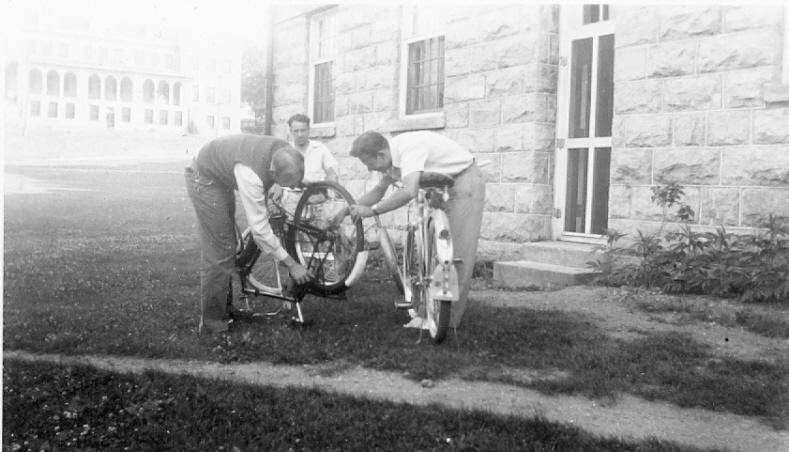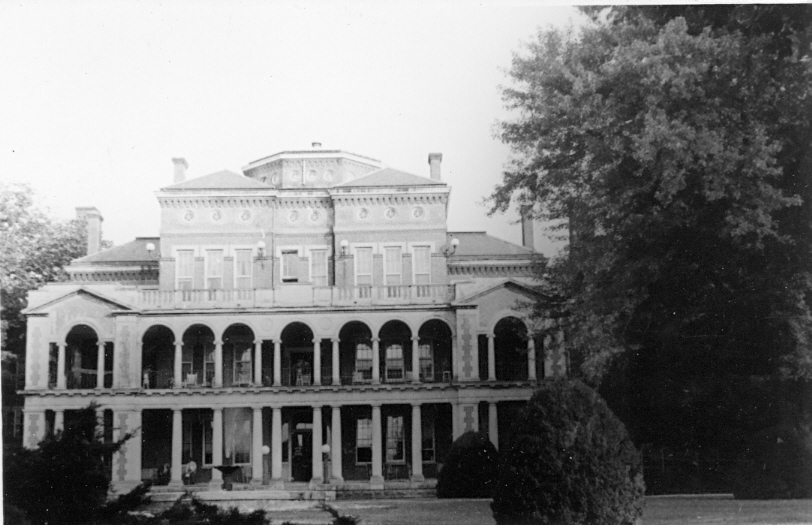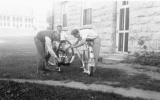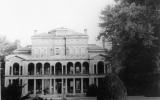CPS Unit Number 109-01
Camp: 109
Unit ID: 1
Title: Southwestern State Hospital
Operating agency: BSC
Opened: 6 1943
Closed: 6 1946
Workers
Total number of workers who worked in this camp: 55
-
 CPS Camp No. 109Marion, VirginiaDigital Image © 2011 Brethren Historical Library and Archives. All Rights Reserved.
CPS Camp No. 109Marion, VirginiaDigital Image © 2011 Brethren Historical Library and Archives. All Rights Reserved. -
 CPS Camp No. 109Administration Building - staff offices and quarters - Southwestern State Hospital. Marion, Virginia.Digital Image © 2011 Brethren Historical Library and Archives. All Rights Reserved.
CPS Camp No. 109Administration Building - staff offices and quarters - Southwestern State Hospital. Marion, Virginia.Digital Image © 2011 Brethren Historical Library and Archives. All Rights Reserved.
CPS Unit No. 109, a Mental Hospital unit located at Southwestern State Hospital in Marion, Virginia operated by the Brethren Service Committee, opened in June 1943 and closed in June 1946. The majority of the unit men served as ward attendants.
Directors: Lowell Wright, William Lowden, Vernon Nichols, Evan Hollingsworth
Of the thirty-seven men as of February 1945, thirteen identified as Brethren and six as affiliated German Baptists.
Men from Brethren projects reported considerably more education and professional experience when entering CPS than those who enlisted in the Army and Navy. They had completed on average 12.22 years of education. Thirty-nine percent of them had completed some college or four years, or some graduate work. Forty-six percent of men in Brethren camps reported their occupations on entry into CPS as in technical or professional work, business management, sales and administration or as students. (Sibley and Jacob pp. 170-72)
The majority of the men served as ward attendants, although some also served in clerical, agricultural, maintenance and construction, motor vehicle operation, technical and professional as well as food preparation roles.
Of the 22,861 person hours accomplished during the life of the unit at Southwestern State Hospital, ward attendants provided 16,258 hours while those serving in technical and professional roles gave 2,834 hours, and those in agriculture contributed 1,404 hours of service. (Selective Service form DSS 52 as published in Eisan p. 212)
In the mental hospitals, the superintendent held authority over not only the work of the unit, but also maintenance and discipline of all staff, including CPS men. For legal reasons, superintendents generally felt a closer responsibility to Selective Service than to either the National Service Board or the Brethren Service Committee.
Men in assistant director roles represented the interests of the CPS men as well as the interests of the Brethren Service Committee to the hospital and to Selective Service and other concerned agencies. The assistant director also assumed leadership in developing activities for off-duty hours. The men fulfilling the assistant director roles at Southwestern State Hospital were draftees selected by the Brethren Service Committee.
Most units also elected an education secretary from unit membership who assisted in camp life. Because of heavy work schedules in the mental hospitals, the units did not have the full range of camp program found in base camps. Recreational activities provided the exception. Assignees in mental hospital units located close to colleges or universities often enrolled in courses for course credit.
At one point during the life of the unit, the hospital made the newspapers during an exposé of conditions in mental hospitals in Virginia. A regular employee attendant was indicted for manslaughter in the death of a patient at the institution. He struck the patient several times and kicked him in the stomach. An autopsy revealed that the patient had died of peritonitis resulting from irregular perforation of his small intestine. (Taylor p. 240)
For information on Brethren mental health and training school units see Leslie Eisan, Pathways of Peace: A History of the Civilian Public Service Program Administered by the Brethren Service Committee. Elgin, IL: Brethren Publishing House, 1948, Chapter 6 pp. 205-238.
See also Alex Sareyan, The Turning Point: How Persons of Conscience Brought About Major Change in the Care of America’s Mentally Ill. Scottdale, PA: Herald Press, 1994.
See also Mulford Q. Sibley and Philip E. Jacob, Conscription of Conscience: The American State and the Conscientious Objector, 1940-47. Ithaca, NY: Cornell University Press, 1952.
Swarthmore College Peace Collection, Camp periodicals database.
For more in depth treatment of mental health and training school units, see Steven J. Taylor, Acts of Conscience: World War II, Mental Institutions, and Religious Objectors. Syracuse, NY: Syracuse University Press, 2009.

